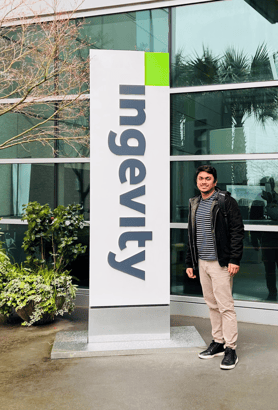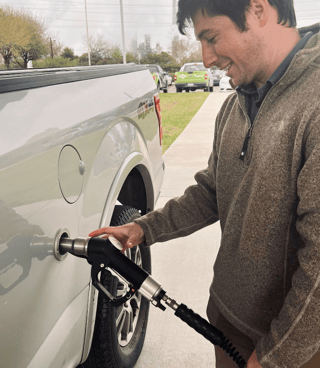Over the spring break, I had the chance to visit Charleston, South Carolina – a city along the Carolinian coast that anyone who visits can easily fall in love with. The town is almost like a perfect melting pot of history, industry, art, and tourist attractions! Along its coastlines, starting from the historic district, are beautiful walks and parks, rows of colorful mansions, and a myriad of restaurants and resto-bars. Go further north and you’ll see ports and their tall container cranes, as well as tall steam stacks of huge industrial plants. All these are a testament to Charleston’s thriving economy.
Also in this lovely city is where one can find the headquarters of INGEVITY, a company whose business stands on the principle of waste-to-value and whose purpose is to create value for its stakeholders by purifying, protecting, and enhancing the world. True to its waste-to-value business model, Ingevity developed an adsorption technology called Nuchar® that reduces vapor emissions in gasoline and diesel engines. Nuchar® technology uses activated carbon made from excess wood chips (i.e. sawdust) from paper and furniture manufacturing. This breakthrough technology is present in many vehicles worldwide and helps curb thousands of gallons of vapor emissions annually – thus saving not only the car owners some extra dollars on gas, but also our atmosphere from fossil fuel vapor pollutants.
 In photo: Me at Ingevity headquarters in Charleston, SC
In photo: Me at Ingevity headquarters in Charleston, SC
Leveraging on its expertise in activated carbon, Ingevity began to manufacture FuelSorbTM which is applied in natural gas vehicles (NGVs). FuelSorbTM contains monoliths of activated carbon that allows storage of natural gas at a lower pressure from 3600 psi (typical pressure requirement for compressed natural gas or CNG) to 900 psi (adsorbed natural gas or ANG), and therefore helps eliminates the need for bulky and expensive equipment to refuel NGVs. With this technology, Ingevity gives fleet operators of light and medium duty vehicles the opportunity to transition to cleaner fuel and achieve their greenhouse gas (GHG) emission reduction targets at a lower cost and without worrying about proximity of a CNG station.
 In photo: An ANG Ford F-150 and Ford Transit Van parked at Ingevity’s ANG refueling site. In between the two vehicles is the refueling appliance. The appliance directly taps into a natural gas access point, therefore eliminating the need for bulky storage tanks and compressors for dispensing.
In photo: An ANG Ford F-150 and Ford Transit Van parked at Ingevity’s ANG refueling site. In between the two vehicles is the refueling appliance. The appliance directly taps into a natural gas access point, therefore eliminating the need for bulky storage tanks and compressors for dispensing.
The company also has a partnership with Ford who produces F-150s, F-250s, and Transit Vans with gaseous prep package which are easily convertible to ANG. Through Ingevity’s partner upfitters Altech-Eco in Arden, NC and Lias Contracting LLC in Dayton, PA, owners of these Ford vehicle models (2016 or newer) may have their trucks and vans upfitted to an ANG-Gasoline bi-fuel set-up. The upfitting costs around $10,000.00 per vehicle which includes installation of the 6 GGE (gasoline gallon equivalent) ANG tank, a protective box, a fuel level indicator, and a refueling receptacle. The refueling appliance costs around $7,000.00 including installation, and comes with a regulator, a dryer, and a proprietary refueling nozzle. With the savings in fuel cost, i.e., natural gas sells at $1.50 per GGE on average while gasoline sells at $4.00 per gallon The payback period per vehicle is estimated at five years and can go down to four years if government incentives are applied.

In photo: Ingevity’s ANG Project Engineer, Dante, demonstrates how to refuel an ANG vehicle. Here, the nozzle locks into the vehicle receptacle while fueling and automatically stops when the maximum pressure is achieved, similar to refueling in a gas station.
Furthering their waste-to-value mission and business model, Ingevity partnered with GreenGasUSA to support the production of renewable natural gas or RNG. RNG comes from methane, also called biomethane, that evolves off the degradation of agricultural, landfill, and industrial wastes, which methane would have been otherwise released to the atmosphere. Methane is a greenhouse gas that is about 25 times more potent than carbon dioxide. Thus, the production of RNG helps in significantly reducing methane emissions by converting methane into usable fuel and eventually to carbon dioxide which is safer to be released into the atmosphere.
Ingevity’s ANG vehicles are commercially available and are now being used by corporations and institutions such as Ozinga Energy, Atlanta Gas and Light, City of Orlando, and SoCalGas. Ingevity also owns a fleet of ANG trucks and vans, 100% of which are running on renewable natural gas. Through its partnership with GreenGasUSA, Ingevity offsets the fossil natural gas usage of its own ANG fleet with RNG and can also do so for the users of the ANG vehicles who choose to participate. In essence, therefore, users of the ANG vehicle could support the replacement of fossil natural gas with its renewable counterpart in the pipelines.
What was once a battle of only a few is now a global movement. The fight against climate change is not at only a fight against greenhouse gases and other pollutants, but more so in rallying the people, senior and rising generations alike, away from the disposable mindset and towards circular economies, and corporations like Ingevity who invests in creating value from anthropogenic wastes play very vital roles in this, our journey. Through their innovations, we are given sustainable alternatives without having to lose much – if any – of the convenience we currently enjoy. It is only up to us whether to embrace them or not, and in a decade or probably less, my hope is for each of us to say, “I’m glad I did”.
Mel Amago '23 is the Ingevity Fellow at the University of Pittsburgh's Center for Sustainable Business. He is pursuing his MBA degree at the Joseph M. Katz Graduate School of Business. He has an undergraduate degree in Chemical Engineering and has worked in manufacturing, oil & gas, and e-commerce.
